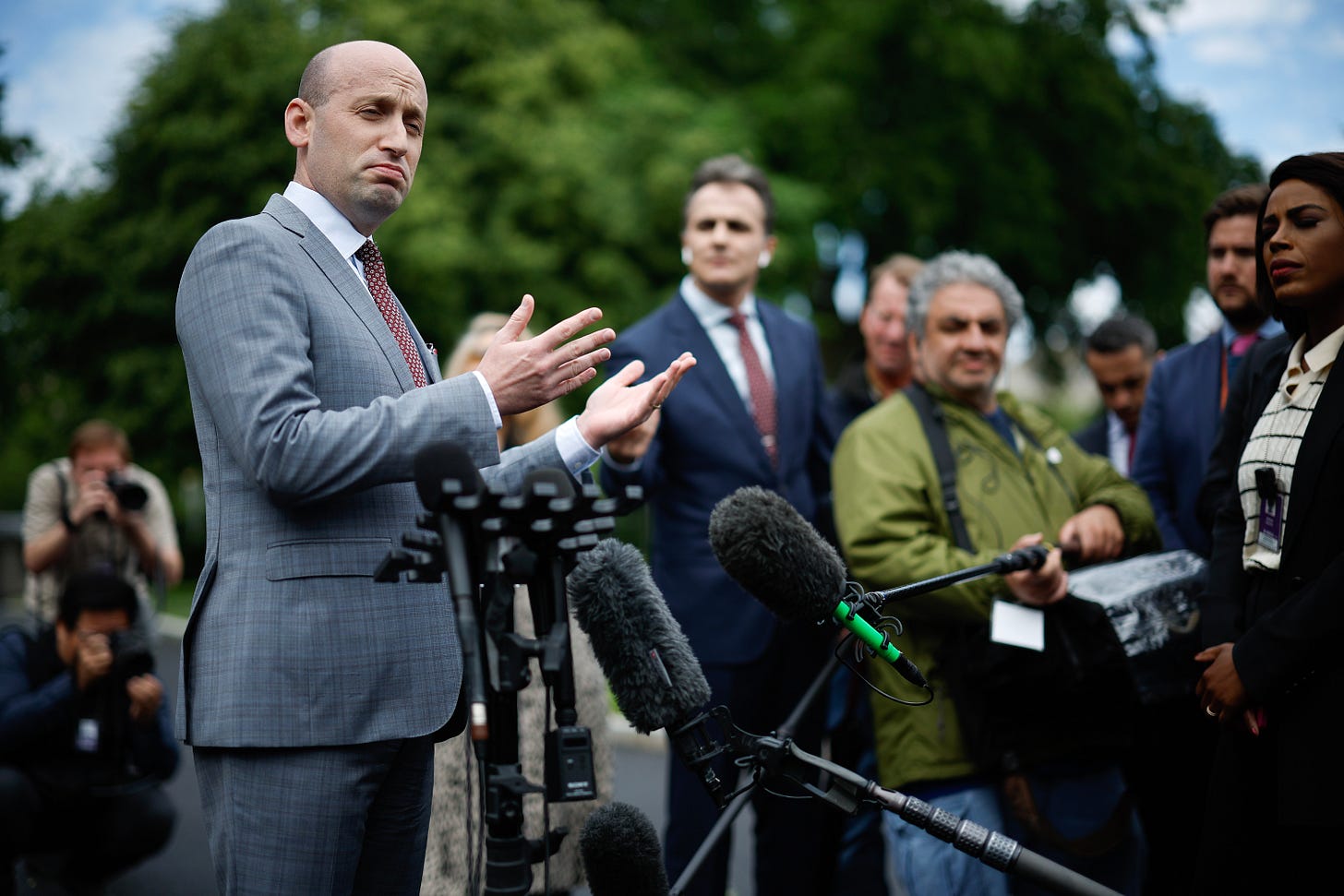Miller threatens to suspend habeas unless Trump can defy judges
Either way, the rule of law loses.
🏛️ ⚖️ 🏛️ With corporate outlets obeying in advance, supporting independent political media is more important right now than ever. PN is possible thanks to paid subscribers. If you aren’t one already, please click the button below to sign up and support our work. 🏛️ ⚖️ 🏛️
So here it is. The habeas explainer you shouldn’t need. Not because you should be well-versed in all things habeas, but because we shouldn’t even need to talk about whether Donald Trump can suspend the rule of law so his administration can more effectively terrorize immigrants. But that’s where we’re at.
On Friday, the staggeringly ghoulish White House deputy chief of staff, Stephen Miller, told a press gaggle that the administration was looking at suspending habeas corpus.
“The Constitution is clear, and that, of course, is the supreme law of the land, that the privilege of the writ of habeas corpus can be suspended at a time of invasion,” he said. “So I would say that’s an action we’re actively looking at.” (Watch below.)
Miller is at least correct that the writ of habeas corpus appears in the Constitution, but he’s wrong about most everything else.
Habeas corpus is Latin for “you have the body.” A detainee or prisoner can challenge their detention by petitioning for a writ of habeas. That requires the government to produce the person before the court so the judge can determine if their imprisonment is unlawful.
Habeas is such a foundational part of Anglo-American law that it well predates the nation’s founding. When England’s King John signed the Magna Carta in 1215, a provision stated that “no man shall be arrested or imprisoned ... except by the lawful judgment of his peers and by the law of the land.” In the United States, the right to habeas appears in the very first Judiciary Act in 1789, giving all federal judges the power to grant the writ.
Everyone has the right to petition for a writ of habeas, including non-citizens. In the immigration context, it can be used to challenge detentions and removals. Indeed, the Trump administration has already argued in court that petitioning for a writ is the only way that detainees can fight their imprisonment.
The problem here, of course, is that the administration doesn’t believe noncitizens are owed any due process. Last month, Trump complained that “we have thousands of people that are ready to go out, and you can't have a trial for all of these people … And a judge can’t say, ‘No, you have to have a trial.’”
Immigrants challenging their removal don’t get trials, a thing Trump would know if he had the least bit of interest in how government works. They have limited rights under an expedited removal process created by Congress. But even that circumscribed process is too much for the White House. Hence Miller’s musings about how the administration is looking into suspending habeas, allowing them to deport people without even the meager protections they currently have. It would strip the courts of any power to order an immigrant’s release.
The Constitution allows habeas to be suspended only in “cases of rebellion or invasion the public safety may require it.” It has only been suspended four times. It was suspended for the whole country during the Civil War. The remaining three times, the suspension applied only to specific locations. During Reconstruction, it was suspended in multiple counties in South Carolina that were under siege from the Ku Klux Klan. In 1905 it was suspended in part of the Philippines during an insurrection there. Finally, after Pearl Harbor was bombed, habeas was suspended in Hawaii.
You’ll notice that each of those situations was actually a rebellion or invasion. But now, the administration is contemplating suspending habeas based on its nonsense theory that America has been invaded by Tren de Aragua, a Venezuelan gang they allege is acting in concert with the administration of Venezuelan President Nicolas Maduro.
One small problem: our own intelligence community issued a memo last month that says pretty much the opposite. The Office of the Director of National Intelligence found no organized or extensive cooperation between the Maduro government and TdA, nor was there evidence that the Venezuelan government was directing TdA to infiltrate the United States via migrants. Far from cooperating, the memo found that the Venezuelan government considers TdA a threat.
First they came for the migrants …
It’s also not clear how, even if TdA was a genuine threat, that would justify all of the administration’s other deportation actions, like revoking the visas of immigrant students or deporting toddlers with cancer or trying to indefinitely detain someone for writing a pro-Palestine op-ed. None of those things are related to an invasion. None of those things can credibly be said to threaten public safety. But the administration sees the suspension of habeas as an all-purpose tool, one that can be used to deport anyone for anything.
Oh, and one other small problem? The administration can’t suspend habeas. Only Congress can. You can read thousands of words about this from Justice Amy Coney Barrett, who wrote a lengthy law review article on the topic before being appointed to the federal bench. And, as much as this is painful to say, the way Barrett explains why that power belongs to Congress is actually super helpful.
A note from Aaron: Working with brilliant contributors like Lisa takes resources. If you aren’t already a paid subscriber, please sign up to support our work.
First, the executive branch already has the power to detain someone. Giving the president the power to suspend rules about that detention would increase the risk of abuse of the power to detain. Next, as commander in chief, the president is the “first responder” to any armed conflict on American soil. Because of that responsibility, it’s understandable, says Barrett, that a president would want to use any tool available to respond to an invasion. Requiring Congress to deliberate about suspending habeas “creates an opportunity for cooler heads to prevail” rather than having the president do so in the heat of the moment. Finally, giving suspension power to Congress means any decision has to go through the normal legislative process, which helps ensure that the writ is suspended rarely, and only after full consideration.
Finally, writes Barrett in a passage that one hopes she remembers when Trump’s unconstitutional suspension of habeas finally comes before the Supreme Court, “one need not envision a tyrannical Executive to appreciate the value of denying the President the suspension power.” Got it. So, even non-tyrannical presidents grabbing hold of the suspension power is bad. But hey, guess what? The guy who appointed you, Amy Coney Barrett, is actually a tyrannical executive, so we have a problem.
One would hope every member of the Supreme Court, no matter how interested they are in helping Trump realize his white supremacist Christofascist dream, would balk at letting him have the power to suspend habeas. Not because those conservatives have a deep commitment to immigrants or even to due process, but because suspending habeas strips all courts, including the Supreme Court, of the power to issue a writ. It completely cuts the courts out of the process of determining whether a detention is unlawful. No judge could demand that the administration bring someone to court to review their detention. No judge could stop people from being removed without any due process.
In theory, the Supreme Court should be incredibly concerned about the executive branch making this sort of power grab, but thus far, they don’t seem all that worried that Trump is trying to become a king.
“It depends on whether the courts do the right thing”
Speaking of courts, let’s not overlook the last part of Miller’s comments: “A lot of it depends on whether the courts do the right thing or not.” This echoes Trump’s remarks when he was complaining about trials, saying, “We’re getting them [detainees] out, and I hope we get cooperation from the courts.”
In Trump’s world, the courts only do the right thing when they agree with him. That’s why House Republicans keep threatening to impeach lower federal court judges who have ruled against him. It’s why they are also sneaking a provision into the fiscal 2025 budget that would limit the ability of judges to enforce contempt of court actions against the administration. It’s why the administration keeps defying court orders.
So what Miller and Trump are saying is that the administration will suspend habeas unless the courts let the administration do whatever it wants, Constitution and separation of powers be damned. Put another way, the administration is demanding that it be unconstitutionally allowed to defy the courts, and if it isn’t allowed to do so, it has no choice but to unconstitutionally suspend habeas.
It feels like a cliche to say this is a full-blown constitutional crisis, because everything the administration does feels like that. (If the shoe fits, etc.) But floating a trial balloon about suspending habeas is particularly bad because that right is so ancient, so core to the very concept of justice, and so necessary to preserve the separation of powers.
Now, we all have to hope that, when the inevitable case about this reaches the highest Court, the conservative majority there still understands and values the rule of law. Given their abysmal track record in this department, that feels like a slender reed for us all to cling to, but it’s pretty much all we’ve got.
That’s it for today
We’ll be back with more tomorrow. If you appreciate today’s newsletter, please support our work by signing up. Paid subscribers make Public Notice possible.
Thanks for reading.







Stephen Miller is Joseph Goebbels, Hitler’s propaganda chief, reincarnated or cloned.
Not just for Miller copying Goebbels evil ideals and actions, the two look identical. Their dead-inside gaze is the same, as is their white supremacy.
Thank you Lisa for focussing on this! It's very curious that Trump-Miller announces or gives hints (in the form of threats always) about what their next outrage is. They are looking for another response other than what they are getting? Across the board on the issues they are testing what they can get away with, first *assuming* that they actually have dictatorial powers. They assume they are have authoritarian powers now with the abdication of the GOP in Congress, and the SCOTUS majority. In a way this challenge is at least good for us to learn about what really makes our country great, how we evolved. And now we can perversely through threats to our democracy. It's down to the people, awakening the sleepy masses. Truth be told, if they are into white supremacy (they are) this law that we live by was created by *white people* through the centuries.
So by announcing their threats, they give us time to get up to speed, to learn, or relearn, remember, what this country is about.The Writ of Habeas Corpus is a good lesson!
https://en.wikipedia.org/wiki/Habeas_corpus